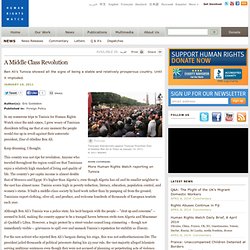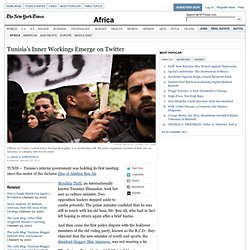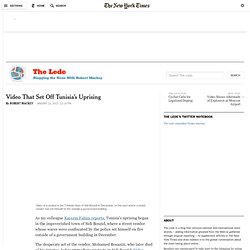

One Small Revolution. A Middle Class Revolution. In my numerous trips to Tunisia for Human Rights Watch since the mid-1990s, I grew weary of Tunisian dissidents telling me that at any moment the people would rise up in revolt against their autocratic president, Zine el-Abidine Ben Ali.

Keep dreaming, I thought. This country was not ripe for revolution. Anyone who traveled throughout the region could see that Tunisians enjoy a relatively high standard of living and quality of life. The country's per capita income is almost double that of Morocco and Egypt. It's higher than Algeria's, even though Algeria has oil and its smaller neighbor to the east has almost none. Although Ben Ali's Tunisia was a police state, his tacit bargain with the people -- "shut up and consume" -- seemed to hold, making the country appear to be a tranquil haven between strife-torn Algeria and Muammar al-Qaddafi's Libya.
Still, those who experienced the repression were a minority of the 10 million Tunisians. This circle also included former political prisoners. Tunisia Leader Shaken as Riots Hit Hamlet of Hammamet. Joy as Tunisian President Flees Offers Lesson to Arab Leaders. Where Were the Tunisian Islamists? Slap to a Man’s Pride Set Off Tumult in Tunisia.
Tunisia’s Inner Workings Emerges on Twitter. Moufida Tlatli, an internationally known Tunisian filmmaker, took her seat as culture minister.

Two opposition leaders stepped aside to confer privately. The prime minister confided that he was still in touch with his old boss, Mr. Ben Ali, who had in fact left hoping to return again after a brief hiatus. And then came the first policy dispute with the holdover members of the old ruling party, known as the R.C.D.: they objected that the new minister of youth and sports, the dissident blogger Slim Amamou, was not wearing a tie. “The first conflict with the old RCD-ists,” Mr. In the week since Mr. Now Mr. His news bulletins have included advance word that the prime minister would resign from his party, and that the education minister planned to reopen the schools.
Critics call him a self-aggrandizing sellout who is lending credibility to a phony revolution still guided by R.C.D. members who were close to Mr. “I am in the government to have first hand info,” he wrote on Twitter recently. How a Single Match Can Ignite a Revolution. Video That Triggered Tunisia's Uprising. Video of a protest in the Tunisian town of Sidi Bouzid in December, on the spot where a street vendor had set himself on fire outside a government building.

As my colleague Kareem Fahim reports, Tunisia’s uprising began in the impoverished town of Sidi Bouzid, where a street vendor whose wares were confiscated by the police set himself on fire outside of a government building in December. The desperate act of the vendor, Mohamed Bouazizi, who later died of his injuries, led to immediate protests in Sidi Bouzid. Video clips of those first protests, recorded on mobile phones and posted on the Internet, spread across Tunisia and the Arab world when they were shared on Facebook and eventually broadcast by satellite news channels like Al Jazeera.
Protesters in Sidi Bouzidi attempting to scale the fence of a government building soon after Mohamed Bouazizi’s self-immolation. These images of protesters clashing with the police made it to YouTube less than two days after Mr.